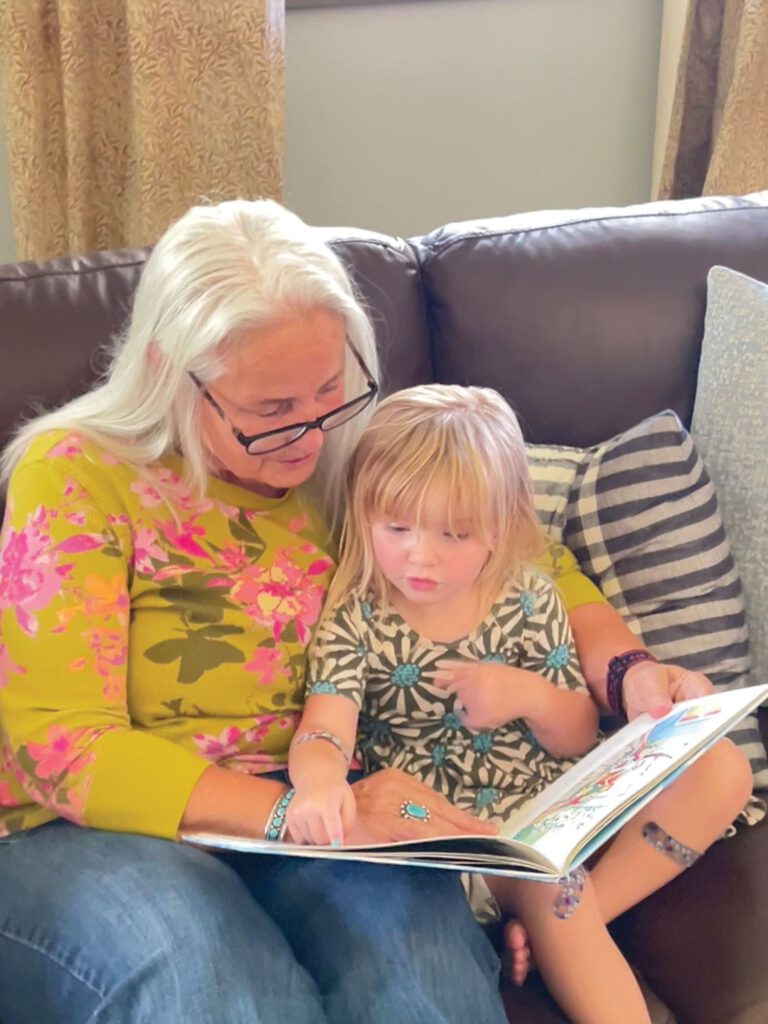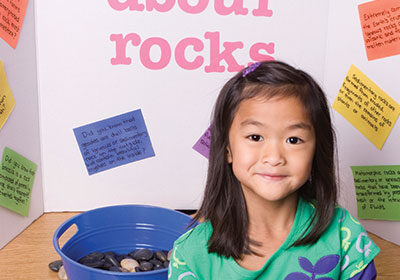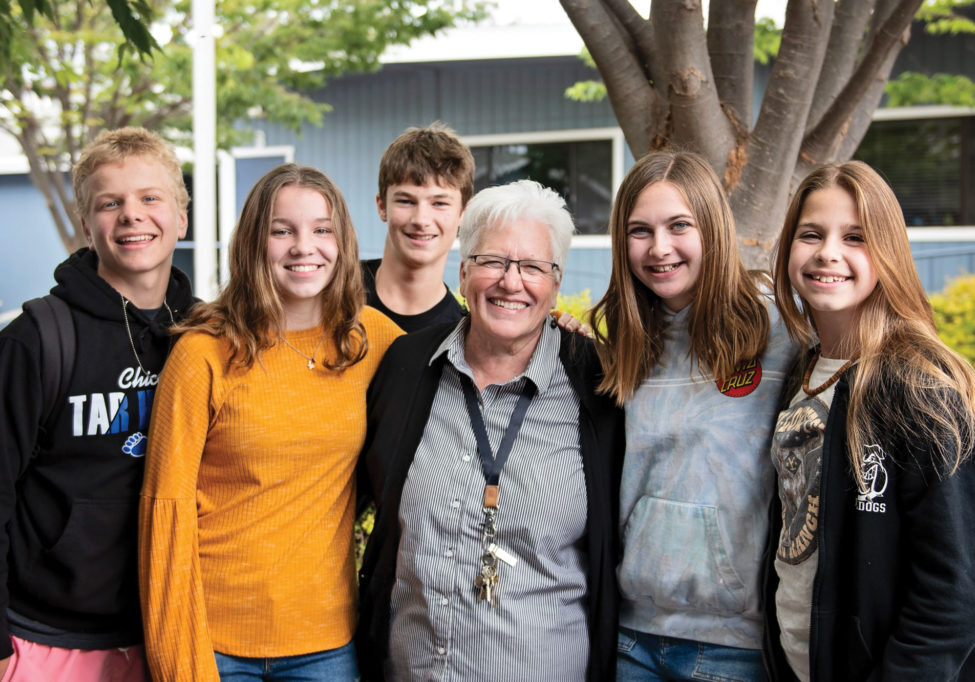One of my most treasured photos from my childhood is of me sitting on my father’s lap as he was reading a book on geology. He was not reading to me, even though he often did, but it was a simple moment where he was showing me that reading and education was a normal part of the day. He had gone back to school at the age of 31 to study geology and physics. I didn’t understand those concepts at age 4, but what I did understand was that reading and learning was important.
I carried on that same tradition with my own son. I read to him from the day he was born, and I too went back to school at the age of 26 to eventually get my master’s degree in child development. I read to him every night before bed until he was 11 years old, and just as I did as a child, he also saw that reading and learning were an important part of life.

Zamora learns a love of reading and literacy as her grandma, Angela Beem, joyfully reads with her.
Photo credit Joann Goble.
The Importance of early literacy
Research shows that a child’s exposure to early literacy creates a direct positive impact on early learning. It is critical for children from birth to 5 years to build their early literacy skills to be successful in school. It may sometimes feel like a daunting task to nurture your very young child’s literacy, but there are several very simple solutions for parents. It’s not about teaching a child to read or doing repetitive worksheets with them. It’s simply to create a love of early literacy. Building that love may look a little different then you might imagine.
Karen Pautz, director of First 5 Siskiyou Children and Families Commission, says that the ages of birth to 5 years are a critical time to build early literacy habbits: “Knowledge is relational which means the habits and skills that are built during that time are carried with the child for the rest of their life.” She says that one of the most important things a parent can do is to be present for the child and that is easiest if parents themselves are engaged in their own self-care, stress relieving techniques and even continuing their own education. “The more parents are engaged and taking good care of themselves with healthy habits,” Karen says, “the more they can help their children. When a parent demonstrates their own curiosity about the world, gives child a variety of experiences, has their child attend preschool and play groups to build positive peer relationships, all these things help their child build early literacy skills.”
Applying early literacy skills
So, how exactly can parents help their children build literacy skills? It turns out, it’s pretty easy. One of the most important things a parent can do is simply talk to their child. According to Jon Peoples, Butte County’s Countywide Children’s Librarian, “Parents can simply talk, sing and play with their child to foster early literacy. Babies and young children learn through repetition, so repeating familiar words and phrases, singing catchy songs and rhymes and playing simple fun games on a regular basis can make a significant positive impact on a child’s literacy and learning.”
When speaking to children, it’s important to speak to them using proper and descriptive vocabulary. Avoid “baby” talk and be intentional when speaking to them. Pautz gives an example of this. “When asking a child if they want a cookie, instead of asking them if they simply want a cookie, ask them if they want a chocolate chip cookie or a round chocolate chip cookie. Ask them what shape the cookie is. It’s easy to build a child’s vocabulary by simply using descriptive words and being intentional in what you say.”
Access to books build literacy
Another critical part in fostering early literacy is access to books. Children should have access to books all throughout the home. “Having a basket or low shelves of books is important. Having books in the living room, the child’s room, the bathroom, etc. allows the child to read and look at books as the child wants,” Karen says. “Spend daily time with books and if the child sees you reading, invite the child to read with you. Showing your excitement of reading helps the child create their own love of reading.” Just as when I sat on my dad’s lap as he read his textbook for his class, it shows the child that books and reading are important.
For parents with limited financial resources, there are several free ways to obtain books for their child. First, go to the library! Many libraries offer programs that are designed to foster early literacy in children. Free books to own are available by signing up with the Dolly Parton Imagination Library (imaginationlibrary.com/usa/). This program sends a free book to your child every month with absolutely no strings attached. You can also visit your local First 5 Resource Center. (See the sidebar for links to First 5s by county.) The First 5 Resource Centers have early literacy resources, resources for parents, classes, downloadable games and skill building worksheets, and a variety of other amazing support programs for parents and children.
Parents are often nurturing their child’s literacy without even knowing it. My father had no idea that simply inviting me to sit with him as he read was a critical moment building my early literacy skills. Parents sing to children without knowing the concrete research as to why it’s so important. But you can do even more by accessing resources and support. By creating a love of early literacy, you are setting your child on a path for school and personal success! Happy reading!
You can sign up for the Dolly Parton Imagination Library at imaginationlibrary.com/usa/
- First 5 Butte County: first5butte.org
- First 5 Glenn County: first5glenncounty.com
- First 5 Shasta County: first5shasta.org
- First 5 Siskiyou County: first5siskiyou.org
- First 5 Tehama County: first5tehama.org
Posted in: Education, Family Life & Support
Comment Policy: All viewpoints are welcome, but comments should remain relevant. Personal attacks, profanity, and aggressive behavior are not allowed. No spam, advertising, or promoting of products/services. Please, only use your real name and limit the amount of links submitted in your comment.
You Might Also Like...

Projectile Homework
Not “flu shots.” Not “chore chart.” Not even “Grandpa’s sauerkraut.” No, the two words that most set my family moaning are these: Class project. It happens a few times a […]

Understanding Dyslexia
Sitting with a small group of second graders, listening as each took a turn reading aloud, it struck me how reading came so easily for some and with such difficulty […]

Bev Landers – A Force for Good For Thousands Of North State School Kids
“My earliest memories are of teaching all my stuffed animals and dolls,” says Bev Landers, Paradise Charter Middle School’s principal and superintendent. “I started babysitting at age 11, as soon […]

Curious Critters – Leaping, Flying, And Coming Your Way!
Reading a book with your child not only fosters literacy, but it also creates family memories that are treasured well into adulthood. We at North State Parent magazine are pleased […]




